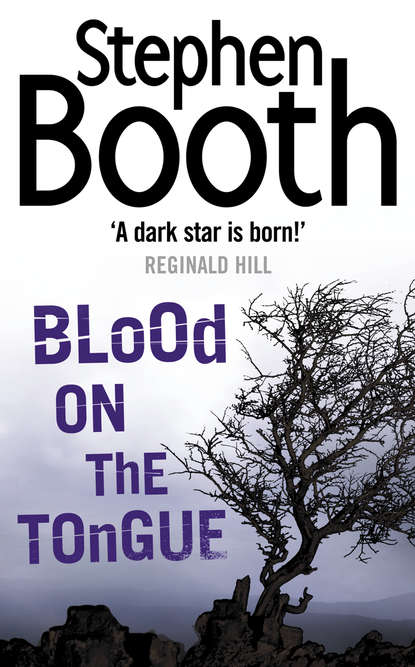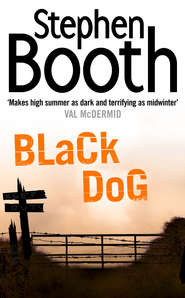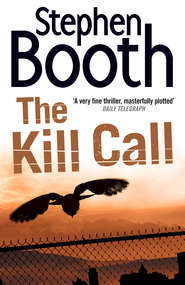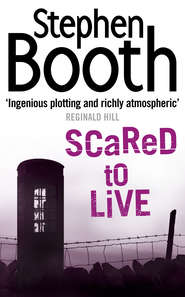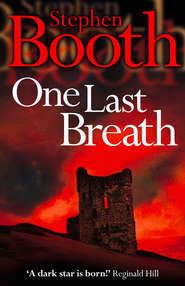По всем вопросам обращайтесь на: info@litportal.ru
(©) 2003-2024.
✖
Blood on the Tongue
Автор
Год написания книги
2019
Настройки чтения
Размер шрифта
Высота строк
Поля
‘I’m sorry, Frank. It just hit me suddenly. This is more than travelling to a foreign country – it’s like venturing into the past.’
‘I understand that.’
‘And it’s a dangerous past. I really feel as though I’m on the borders of hostile territory.’
‘Don’t expect hostility from every quarter,’ he said. Not necessarily.’
Outside, Alison Morrissey looked at the grey sky and ran a hand across her forehead.
‘You’re right,’ she said. ‘Transatlantic flights knock hell out me. I suppose it’s past breakfast time here?’
‘Nearly lunchtime, in fact. We can find somewhere to eat here at the airport, if you like.’
‘May we drive out to Derbyshire first, Frank? How long will that take?’
‘It depends whether they’ve got the A57 clear yet,’ he said. ‘I had to come here by the motorway. The last I heard on the radio traffic bulletins, the Snake Pass was still blocked. I don’t know why – they’re usually pretty good at getting the snowploughs out to clear the main roads. Perhaps there’s been an accident or something.’
Grace Lukasz peered cautiously round the door into the back room of the bungalow, clinging on to the wheels of her chair to suppress the noise. Zygmunt was in his armchair by the table. He looked as though he might be asleep. His hands lay on the table, the blue veins standing up prominently, as if he really did suffer from the high blood pressure that he had always complained about, but which the doctors said didn’t exist. His head was tipped against the back of the chair, and he had taken off his spectacles. Grace could see the red marks on the sides of his nose and the small wings of white hair pushed up over his ears. There were tufts of hair inside his ears, too, and more hair on his neck where he never thought to shave.
The old man’s eyes were closed, but Grace wasn’t sure that he was really sleeping. Often he sat like this while awake. Zygmunt always said he was thinking, when he took the trouble to explain at all. Grace supposed he was going back over his life in his mind, dwelling on his past. It was all he seemed to do now, to dwell on the past. But maybe she was misjudging him. Perhaps the old man was thinking of his wife, Roberta. She doubted it, though. It was more likely that he was thinking of Klemens Wach. These days, he thought mostly about Klemens.
Next Sunday was the day for the Edendale oplatek dinner. Almost the whole of the Polish community would gather for the event in the ex-servicemen’s club, the Dom Kombatanta. Grace knew that for Zygmunt this would be the emotional high point of the year, more important even than Wigilia, the Christmas Eve celebration. This was the time when everyone began the year anew, but it was also a chance to reflect on their history and their place in the world. Most of the folk who would come to the dinner had not been born in Poland, of course. But since Solidarity and democracy, and the possibility of EU membership, some of those people had begun to talk more and more about their culture, their roots, their place in Europe. Not Zygmunt, though. Zygmunt didn’t talk much at all these days. When he did, it was about the past.
But still, there would be the dinner. Though the community celebration had drifted back into January, it was no less of an occasion and everything had to be done just right. Grace could taste already the beetroot soup, the poached pike, the carp with horseradish sauce, the mushroom-stuffed tomatoes. The ladies who organized the dinner clung tenaciously to the traditions, no matter how much trouble they had to go to.
The stops had been pulled out for the family Wigilia, too, when all of them had sat down to the traditional twelve meatless dishes, with the extra place set for an unexpected guest. First they had shared the oplatki wafers. The symbols of reconciliation and forgiveness meant more this year than ever. Of course, forgiveness wasn’t easy. Grace knew Peter was thinking of their eldest son in London, with no family around him to celebrate Wigilia, except some skinny bottle-blonde. They had sent an oplatek to Andrew as always. But whether Andrew had shared it with his blonde was doubtful. As far as Grace could gather, the apartment they rented in Pimlico contained nothing of relevance to oplatek, precious little that spoke of forgiveness.
The younger members of the family would change the traditions, if they had their way. Richard and Alice were embarrassed by the whole business. They would have made a meaningless ritual of oplatek just to get it over with quickly, so they could move on to the food and watch some American film on television. But they knew better than to upset Zygmunt, not at this time of year, and particularly not in these last few months. It was the time for reconciliation, when they could forgive each other their faults and their mistakes over the previous year. It was not a time for arguments.
So Zygmunt, as the eldest, had taken the first oplatek and offered it to his sister Krystyna, blessing her and wishing her health and a good year ahead. She had then broken off a piece of his wafer and offered her own oplatek in turn. And she had gazed into his face as she carefully wished him health and happiness in the year ahead, repeating the words as she was supposed to; but then her voice had broken and the old woman had begun to cry. Grace had edged her wheelchair nearer and put her arm round Krystyna’s shoulders. But the old woman had looked as though she would go on weeping for ever, for the whole twelve days of Christmas maybe, right through to the Feast of the Three Kings. The front of her best dress had got stained with her tears.
Zygmunt had simply frowned and waited for her to continue with the ceremony, until everyone had shared their wafers with each other, biting into the nativity scenes moulded into the unleavened bread. And then, and only then, had they sat down to dinner, to the twelve meatless courses, one for each apostle. The family had visibly sighed with relief. Some of them had expected Zygmunt to make a speech, to talk about the mistakes and the sins of the last year, as he said his father and grandfather had always done, listing all the things the young people had done wrong before forgiving them and wiping the slate clean for a new year.
If Zygmunt had done that, it would have made things difficult. It was easier to pretend things hadn’t happened when they weren’t spoken out loud.
Grace took one last look at Zygmunt, to assure herself that he was still breathing, and backed across the passage. Peter was in the conservatory, among his cacti and the pelargoniums. There remained a thin covering of snow on the glass panels of the roof, and the light beneath it was pale blue.
‘Is Dad all right?’ he said, without turning from his inspection of a spiky monstrosity on a high shelf. His hearing was attuned to the sound of her chair. Even Zygmunt had acute hearing; Grace wouldn’t have been surprised if the old man had known she was there, in the doorway of the room, all the time she had been looking at him. It would have been just like him to pretend he was unaware of her. It was like Peter, too. She could imagine him being exactly the same when he was a decade or two older. They were stubborn and hot-headed in turns, immovable or flying into tempers. His unpredictability had been one of the things that had attracted her to Peter. But recently his temper had been kept firmly in check, corked up inside.
‘He’s fine,’ she said. ‘He’s been looking at the photo albums.’
It hardly seemed necessary for Grace to say it. The photographs had been in front of Zygmunt on the table where they stayed almost permanently. They were photographs of the family, the bits of the Lukasz history pieced together as best they could be, given the gaps, the sudden ends to so many lives. There was nothing that could be said to explain the page on which a young man of eighteen stood smiling and full of life in one photo, while below it the rest of the page was blank but for an almost indecipherable shot of a metal plaque.
At Wigilia, there had been many quiet prayers as the Lukasz family had tried to connect with their relatives overseas. They had been thinking mostly of Zygmunt and Krystyna’s cousins in Poland, but now also of Andrew. Everybody had spoken of him as Andrzej in the presence of the old people.
Krystyna said she always tried to conjure the memory of her dead parents back in Poland to strengthen the connection. Grace wanted to ask her if the prayers actually worked. But a glimpse of Krystyna’s face in an unguarded moment told her what she wanted to know.
As always, there had been midnight Mass at the Church of Our Lady of Czestochowa on Harrington Street, under the images of the Black Madonna. Alongside the church was the Polish Saturday School, where a handful of pupils still kept the language alive, studying for their Polish GCSE exams, learning the history of Poland and the Catholic faith. It was the children of the Saturday School who would stage the Nativity play at the oplatek dinner next Sunday.
In church they had all joined in the singing. Some of the men smelled of vodka, and even some of the women were flushed too. But they all tried to sing, nevertheless. The Poles never seemed to have good singing voices, but they made up for it with enthusiasm. Even Zygmunt, in his croaky voice, had joined in with his favourite Koledy, the Christmas carols that followed Mass.
There had, of course, been the conversation – the catching up on the latest news. All their Polish acquaintances loved a bit of gossip. It was futile to try to keep the intrusion out of their lives. Grace was glad of the snow as an excuse for keeping to the house, because she didn’t know what to say when their friends asked after Andrew.
She watched Peter stroke the firm leaves of the cactus and touch the tip of his finger to the points of the three-inch long spikes. He pressed on them until the spikes looked as though they would pierce his skin like nails.
‘There was a phone call earlier,’ he said.
‘Yes?’
‘It was that man, Frank Baine.’
Grace froze. Irrationally, she wanted to reach out and grab the pot the cactus was in, to hurl it against the wall and smash it. She wanted to fling it through the glass on to the flags in the back garden. She wanted to crush its ugly, vicious spikes and watch the fluid spurt from its swollen body. But she couldn’t even reach that high.
‘She’s arrived then, has she?’ said Grace.
‘She flew into Manchester this morning.’
‘Are you going to tell him?’
Peter shook his head. ‘Let him rest a while longer,’ he said. ‘He needs his rest.’
Grace recalled the extra place that had been set at the Wigilia dinner. For an unexpected guest, Krystyna had said. The old lady never tired of explaining that it was the tradition, that it meant they could provide hospitality for any wanderer who might be travelling along the road that night, for any stranger who might knock at the door, whoever that person might seem to be. For at Wigilia, the stranger could be Jesus himself. Grace wanted to laugh out loud at the idea of Jesus wandering along Woodland Crescent, Edendale, on Christmas Eve and deciding to ring the bell at number 37. Surely he had better things to do, just as her parents had told her Santa Claus had at Christmas.
But Grace had said nothing. It had been Zygmunt who had shaken his head and smiled at his sister’s words. Then, in his quiet, barely audible voice, speaking in Polish, he had insisted the extra place was set for those who were absent, for members of the family who had died. What he meant, of course, was that this place was for his cousin Klemens. It had been set at Wigilia when Zygmunt had first become the head of his own household, and every year since.
But Grace knew this year had been the last time. Next Wigilia, the extra place would no longer be for the absent Klemens. It would be for Zygmunt.
It might have been more than the cold that made Alison Morrissey shiver and pull her coat closer around her shoulders. In fact, the sun was already rising over Stanage Edge and Bamford Moor. In another hour it would have eased some of the chill from the air and melted away the mist that clung to the black rampart of Irontongue Hill. Morrissey looked as though the sun would bring her no warmth, as though it would take much more than a dose of winter sunlight to do that.
She was looking across a few yards of rough grass to a snow-covered peat moor and an eruption of bare rock. The wind was scraping across the moor from a more distant mountain to the north.
‘The rock there is Irontongue,’ said Frank Baine. ‘In the distance is Bleaklow.’
‘This place certainly looks bleak in the snow.’
‘Even without the snow, it’s still bleak.’
It was Irontongue Hill that took her attention. Baine had already told her that it got its name from the eruption of black rock on its summit, an uncompromising slab of millstone grit thrown up by ancient volcanic activity.
Morrissey turned away. The valley below them looked vast and mysterious in the darkness. It lay like a rumpled sheet tugged into peaks and valleys by a restless sleeper. But gradually the lights of scattered villages and farms were vanishing into the grey wash of dawn. The shadows of the hills deepened and began to spread dark fingers across a patchwork of fields, groping and fumbling among the yards of stone farmhouses and the gardens of invisible hamlets.
‘I didn’t anticipate it would be so cold in England,’ she said. ‘I didn’t bring the right clothes.’
‘None of your clothes would have been the right ones,’ said Baine. ‘The weather changes by the minute in these parts. This snow could be gone completely tomorrow.’
‘Let’s hope so. I’ve got to see the site. That’s very important to me.’
‘I understand that,’ said Baine.





